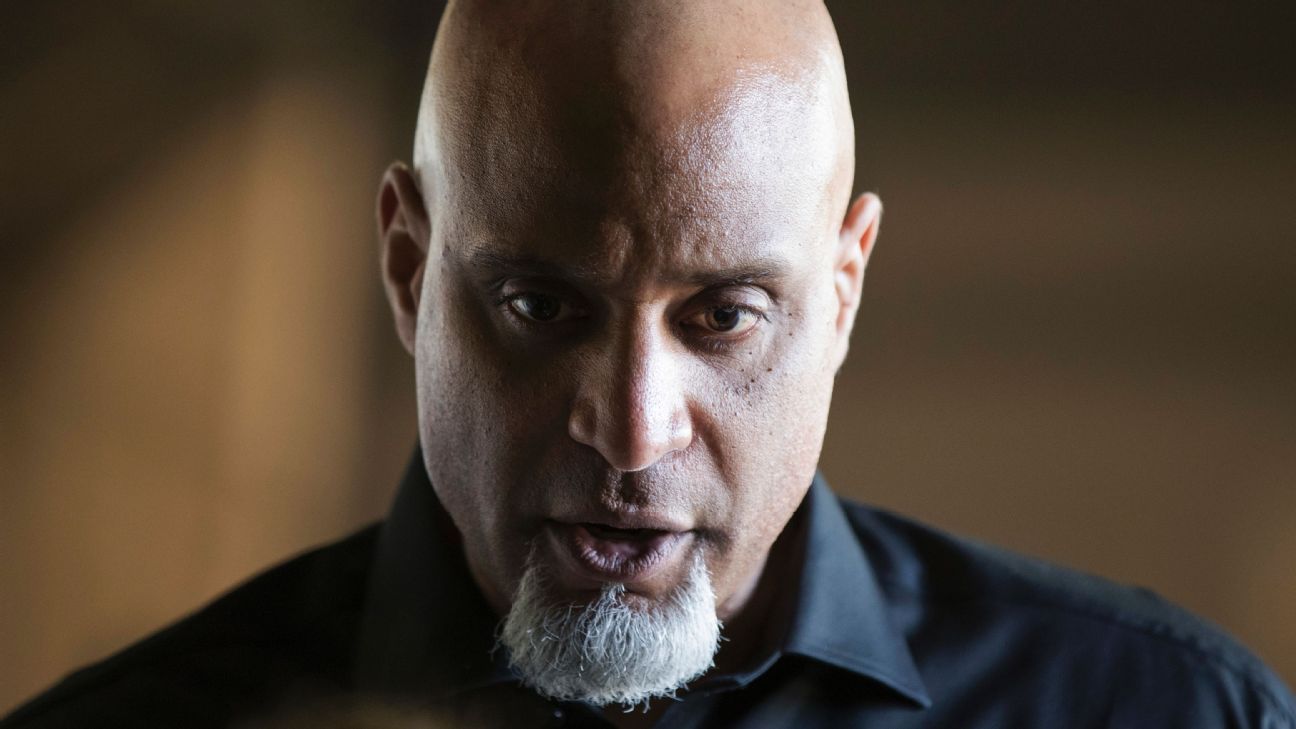In his public statements about the evolution of the free-agent market, Tony Clark, the executive director of the Major League Baseball Players Association, has taken pains not to use the word “collusion.” For more than two years now, the MLBPA has asked agents to take notes on the free-agent conversations they have with teams so it can search for patterns, smoking guns, anything that might hint at coordination among the 30 teams. Nothing actionable has been found.
It made the tone of a release issued Wednesday by the union that much more startling. Clark all but accused teams of colluding based on the words of Atlanta Braves general manager Alex Anthopoulos, who in a conference call Tuesday with reporters had alluded to conversations with other teams about free agency and how it would affect trade discussions.
Clark’s words were unsparing. Amid announcing that the union would investigate teams potentially running afoul of the collective bargaining agreement, Clark said Anthopoulos “call[ed] into question the integrity of the entire free-agent system. The clear description of club coordination is egregious.”
The notion of teams discussing free agents, if only in passing, does ring true. “Are we supposed to talk about only trades?” one general manager asked Wednesday. “And do they want us to talk trades with no other context?” The union’s answer, at least according to its statement, is: yes. Because anything beyond that, the argument goes, would violate Article XX(E)(1) of the collective bargaining agreement, which ends: “Players shall not act in concert with other Players and Clubs shall not act in concert with other Clubs.”
It was a bold attack by the union, one that drew huzzahs from some players who believe the league is colluding and eye-rolls from others who saw it as little more than grandstanding. Whatever the motivation, it was a shot across the bow from Clark on the third day of free agency. With another offseason expected to mirror the past two winters — slow, dreary, disappointing for players — Clark has made his style clear. He is going to fight.
This particular skirmish could take months, maybe more, to play out. The union’s next step as part of its investigation will be to request information from the league. The questions it will ask to determine coordination among teams and how MLB will respond to the request are key. If the league doesn’t cooperate, the union could file a grievance to gather information. If the league does cooperate and the union finds actions it believes constitute a violation of the collective bargaining agreement, the MLBPA could file a grieving alleging collusion.
Further, it could look to Article XX(E)(5), which states that if an arbitration panel finds five or more teams violated XX(E)(1) about acting in concert with other teams, the MLBPA can reopen the collective bargaining agreement after giving MLB 60 days’ notice.
All of that, of course, depends upon the union finding something it hasn’t found in years of searching. Collusion is not impossible to prove, as the MLBPA showed three times in the 1980s. The most recent collusion case concerned a so-called “information bank,” which the league created to share offers teams were making to players. It was the epitome of clear and egregious, and the league paid players $280 million in damages.
This case, at least at the start, is far more opaque. It’s fairest to look at what Anthopoulos said in the context of his entire quote, which he gave to reporters on a conference call after the Braves re-signed Tyler Flowers and Nick Markakis, and which The Athletic printed in full.
“We always take up until the last day because things occur — trade scenarios, signings,” Anthopoulos said. “And look, we’re still obviously at the beginning of the offseason. We’ve got to make decisions on these players at this time because the language in their contracts dictated that we had to make those decisions today. But we know the landscape can change quite a bit between now and spring training. We examined the free-agent market. We’ve definitely done a pretty good analysis now that the World Series is over. We could at least have general conversations with agents, just in terms of expressing interest.
“Every day you get more information. And we’ve had time to connect with 27 of the clubs — obviously the Astros and [Nationals] being in the World Series, they were tied up — but we had a chance to get a sense of what the other clubs are going to look to do in free agency, who might be available in trades. So, the three weeks have been productive for us, just getting more information. All that shaped some of the decisions that we made. But we know there’s going to be a lot more information to come, and things are certainly going to develop over the next few months, and there will be a chain reaction with certain signings — someone signs in a certain place, maybe another player that’s not available today becomes available at that time. So, it’s going to be pretty fluid, and I think we’re in a good position to start the offseason.”
The union took umbrage at the Braves having a “sense of what other clubs are going to look to do in free agency.” By Wednesday night, Anthopoulos had walked back his words, saying he misspoke, didn’t discuss free agents or the free-agent market, and that he apologized for the confusion.
It did not take Anthopoulos saying it out loud for the union, or anyone else in the industry, to know these sorts of conversations happen. They happened in 2015, before the current agreement. They happened in 2010. They happened in 2000. They have happened every year of the current quarter-century of labor peace. Before the offseason kicks into gear, one team calls another. They ask what they’re looking for. They kick possibilities back and forth. They try to contextualize what is what. They say if they can’t fill a position via trade, they might go out and get a free agent.
One executive argues that scenario constitutes information-gathering — something paramount in baseball today, when a minuscule knowledge advantage can be worth tens of millions. It’s not an information bank, he said. It’s certainly not working together, he said. It’s trying to understand the lay of the land to beat them. It’s pragmatism.
Now, nothing says pragmatism and collusion can’t be bedfellows — and the burden is on the union to prove that what came off as relatively innocent from Anthopoulos is something more. But if the union is determined to be dogmatic about free agency — and there is nothing more precious to it than free agency — then this case will persist and cleave the relationship between the parties even more.
At this point, the communication between the sides is strained, the respect for one another not particularly acute in either direction, and the fear of a work stoppage upon the expiration of the collective bargaining agreement in 2021 palpable. That’s still a long way off, but they’ve been saying that for two years now, and in those two years none of the issues between the parties have been resolved. If anything, they’ve worsened.
And so baseball is left with days like Wednesday, which are bound to become more frequent. As the ramifications of the basic agreement continue to reverberate, Clark has shown he’s not going wear the consequences of it without a fight. Sooner rather than later, MLB is bound to fight back, and the labor war that has been brewing for years will feel closer than ever.

